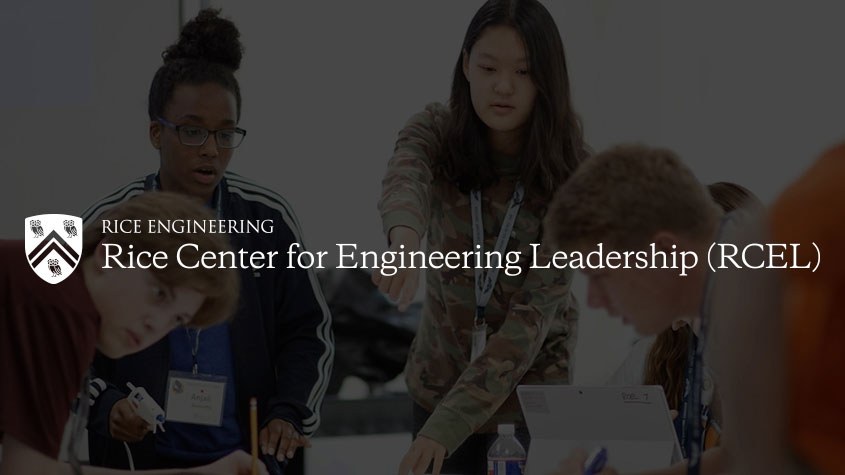Think of Rice ELITE Tech Camp as summer camp for high-school students without the sunburn, mosquitoes and COVID-19.
“Our goal at the Rice Center for Engineering Leadership (RCEL) was to create an environment where students can learn technical and leadership skills at an elite, Rice-like, online engineering camp, one with a low student-teacher ratio,” said C. Fred Higgs III, RCEL faculty director, vice provost for academic affairs and John and Ann Doerr Professor of Mechanical Engineering.
The camp has leadership and technology components. In one-week virtual sessions starting July 6, high-school students will have a choice of seven technology courses:
- RCEL001: Data Analytics for COVID-19 Research h
- RCEL002: Data Detectives – Data Science in Consumer Markets
- RCEL003: Deep Learning – Deploying AI to Maintain Smart Cities
- RCEL004: Learning Python to Solve Engineering Problems
- RCEL005: 3D Modeling and 3D Printing
- RCEL006: Internet of Things, Machine Learning, and Python
- RCEL008: Learning C++ for Human Spaceflight Engineering
RCEL started its ELITE (Emerging Leaders in Technology and Engineering) summer camp in 2018 but this year has adapted to the demands of the pandemic lockdown and moved it entirely online.
The head instructors are Rice engineering faculty, postdoctoral students, and engineering professionals from industry and academia who have designed and will oversee the advanced tech content and daily live labs. Kaz Karwowski, RCEL executive director, sought to ensure consistent quality and content delivery.
Rice ELITE Tech includes leadership and college readiness components, including project management, technical communications and ethics. Interviews with Rice engineering department chairs and other faculty members will be conducted by RCEL industry liaison George Webb.
More than 70 Rice engineering students and several from natural sciences interviewed for 35 live instructor positions, the “face” of the camp. The RCEL team, headed by leadership initiatives director Ebony Wiley, trained the undergraduate and graduate students to lead the live camp sessions.
“We wanted to ensure the Rice students have a professional experience and a technical internship that they can build upon for future opportunities,” Wiley said.
“Normally we can’t find this many available non-freshman engineering students in May, which suggests that intern opportunities have dwindled as the result of COVID-19,” Higgs said.
Among those hired as instructors is Ariel Feldman, who graduated from Rice in May with a degree in computer science and cognitive sciences, and a minor in neuroscience. In the fall, she begins graduate school at Carnegie Mellon, studying neural computation.
In the spring, Feldman was a lab assistant for ELEC 220, “Fundamentals of Computer Engineering,” when Ray Simar, professor in the practice of electrical and computer engineering (ECE), moved the class online via Zoom.
“Ray was determined and well prepared, so I felt a lot more comfortable joining this online camp having that experience under my belt. Ray had shown us the ropes for canvas and Zoom, and it seemed an excellent opportunity to share that knowledge and expand on it,” said Feldman, who as an undergraduate worked as a teaching assistant and an academic fellow at Lovett College.
Jade McAdams, a junior in mechanical engineering, started taking RCEL classes in her first semester as a Rice freshman and worked last summer for the Rice ELITE Camp on campus.
“My goal,” McAdams said, “is to encourage high-school students to consider ways they can start being ‘engineers’ even before they enter college. As they learn how to analyze data, write code, or perform 3D modeling, my hope is for them to realize how much fun engineering can be. As to the engineering leadership component, I’m excited for students to gain an understanding of how much there is to being an engineer that isn’t taught in technical classes.”

